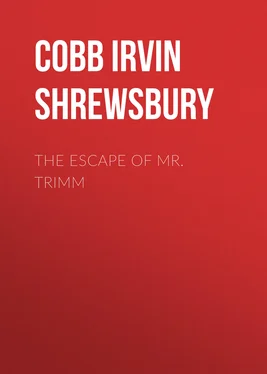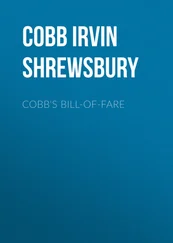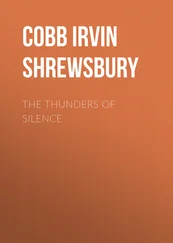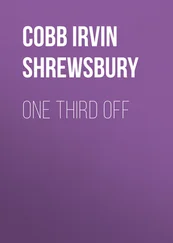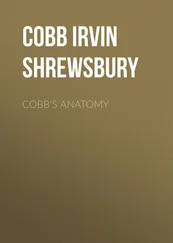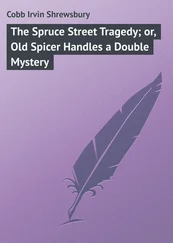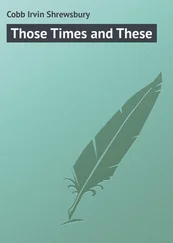Irvin Cobb - The Escape of Mr. Trimm
Здесь есть возможность читать онлайн «Irvin Cobb - The Escape of Mr. Trimm» — ознакомительный отрывок электронной книги совершенно бесплатно, а после прочтения отрывка купить полную версию. В некоторых случаях можно слушать аудио, скачать через торрент в формате fb2 и присутствует краткое содержание. Жанр: foreign_prose, Классический детектив, foreign_detective, foreign_antique, на английском языке. Описание произведения, (предисловие) а так же отзывы посетителей доступны на портале библиотеки ЛибКат.
- Название:The Escape of Mr. Trimm
- Автор:
- Жанр:
- Год:неизвестен
- ISBN:нет данных
- Рейтинг книги:4 / 5. Голосов: 1
-
Избранное:Добавить в избранное
- Отзывы:
-
Ваша оценка:
- 80
- 1
- 2
- 3
- 4
- 5
The Escape of Mr. Trimm: краткое содержание, описание и аннотация
Предлагаем к чтению аннотацию, описание, краткое содержание или предисловие (зависит от того, что написал сам автор книги «The Escape of Mr. Trimm»). Если вы не нашли необходимую информацию о книге — напишите в комментариях, мы постараемся отыскать её.
The Escape of Mr. Trimm — читать онлайн ознакомительный отрывок
Ниже представлен текст книги, разбитый по страницам. Система сохранения места последней прочитанной страницы, позволяет с удобством читать онлайн бесплатно книгу «The Escape of Mr. Trimm», без необходимости каждый раз заново искать на чём Вы остановились. Поставьте закладку, и сможете в любой момент перейти на страницу, на которой закончили чтение.
Интервал:
Закладка:
But this particular buzzard now—wasn't he making for Little Niggerwool? The squire did not like the idea of that. He had not thought of the buzzards until this minute. Sometimes when cattle strayed the owners had been known to follow the buzzards, knowing mighty well that if the buzzards led the way to where the stray was, the stray would be past the small salvage of hide and hoofs—but the owner's doubts would be set at rest for good and all.
There was a grain of disquiet in this. The squire shook his head to drive the thought away—yet it persisted, coming back like a midge dancing before his face. Once at home, however, Squire Gathers deported himself in a perfectly normal manner. With the satisfied proprietorial eye of an elderly husband who has no rivals, he considered his young wife, busied about her household duties. He sat in an easy-chair upon his front gallery and read his yesterday's Courier-Journal which the rural carrier had brought him; but he kept stepping out into the yard to peer up into the sky and all about him. To the second Mrs. Gathers he explained that he was looking for weather signs. A day as hot and still as this one was a regular weather breeder; there ought to be rain before night.
“Maybe so,” she said; “but looking's not going to bring rain.”
Nevertheless the squire continued to look. There was really nothing to worry about; still at midday he did not eat much dinner, and before his wife was half through with hers he was back on the gallery. His paper was cast aside and he was watching. The original buzzard—or, anyhow, he judged it was the first one he had seen—was swinging back and forth in great pendulum swings, but closer down toward the swamp—closer and closer—until it looked from that distance as though the buzzard flew almost at the level of the tallest snags there. And on beyond this first buzzard, coursing above him, were other buzzards. Were there four of them? No; there were five—five in all.
Such is the way of the buzzard—that shifting black question mark which punctuates a Southern sky. In the woods a shoat or a sheep or a horse lies down to die. At once, coming seemingly out of nowhere, appears a black spot, up five hundred feet or a thousand in the air. In broad loops and swirls this dot swings round and round and round, coming a little closer to earth at every turn and always with one particular spot upon the earth for the axis of its wheel. Out of space also other moving spots emerge and grow larger as they tack and jib and drop nearer, coming in their leisurely buzzard way to the feast. There is no haste—the feast will wait. If it is a dumb creature that has fallen stricken the grim coursers will sooner or later be assembled about it and alongside it, scrouging ever closer and closer to the dying thing, with awkward out-thrustings of their naked necks and great dust-raising flaps of the huge, unkempt wings; lifting their feathered shanks high and stiffly like old crippled grave-diggers in overalls that are too tight—but silent and patient all, offering no attack until the last tremor runs through the stiffening carcass and the eyes glaze over. To humans the buzzard pays a deeper meed of respect—he hangs aloft longer; but in the end he comes. No scavenger shark, no carrion crab, ever chambered more grisly secrets in his digestive processes than this big charnel bird. Such is the way of the buzzard.
The squire missed his afternoon nap, a thing that had not happened in years. He stayed on the front gallery and kept count. Those moving distant black specks typified uneasiness for the squire—not fear exactly, or panic or anything akin to it, but a nibbling, nagging kind of uneasiness. Time and again he said to himself that he would not think about them any more; but he did—unceasingly.
By supper time there were seven of them.
He slept light and slept badly. It was not the thought of that dead man lying yonder in Little Niggerwool that made him toss and fume while his wife snored gently alongside him. It was something else altogether. Finally his stirrings roused her and she asked him drowsily what ailed him. Was he sick? Or bothered about anything?
Irritated, he answered her snappishly. Certainly nothing was bothering him, he told her. It was a hot enough night—wasn't it? And when a man got a little along in life he was apt to be a light sleeper—wasn't that so? Well, then? She turned upon her side and slept again with her light, purring snore. The squire lay awake, thinking hard and waiting for day to come.
At the first faint pink-and-gray glow he was up and out upon the gallery. He cut a comic figure standing there in his shirt in the half light, with the dewlap at his throat dangling grotesquely in the neck opening of the unbuttoned garment, and his bare bowed legs showing, splotched and varicose. He kept his eyes fixed on the skyline below, to the south. Buzzards are early risers too. Presently, as the heavens shimmered with the miracle of sunrise, he could make them out—six or seven, or maybe eight.
An hour after breakfast the squire was on his way down through the weedfield to the county road. He went half eagerly, half unwillingly. He wanted to make sure about those buzzards. It might be that they were aiming for the old pasture at the head of the swamp. There were sheep grazing there—and it might be that a sheep had died. Buzzards were notoriously fond of sheep, when dead. Or, if they were pointed for the swamp, he must satisfy himself exactly what part of the swamp it was. He was at the stake-and-rider fence when a mare came jogging down the road, drawing a rig with a man in it. At sight of the squire in the field the man pulled up.
“Hi, squire!” he saluted. “Goin' somewheres?”
“No; jest knockin' about,” the squire said—“jest sorter lookin' the place over.”
“Hot agin—ain't it?” said the other.
The squire allowed that it was, for a fact, mighty hot. Commonplaces of gossip followed this—county politics and a neighbor's wife sick of breakbone fever down the road a piece. The subject of crops succeeded inevitably. The squire spoke of the need of rain. Instantly he regretted it, for the other man, who was by way of being a weather wiseacre, cocked his head aloft to study the sky for any signs of clouds.
“Wonder whut all them buzzards are doin' yonder, squire,” he said, pointing upward with his whipstock.
“Whut buzzards—where?” asked the squire with an elaborate note of carelessness in his voice.
“Right yonder, over Little Niggerwool—see 'em there?”
“Oh, yes,” the squire made answer. “Now I see 'em. They ain't doin' nothin', I reckin—jest flyin' round same as they always do in clear weather.”
“Must be somethin' dead over there!” speculated the man in the buggy.
“A hawg probably,” said the squire promptly—almost too promptly. “There's likely to be hawgs usin' in Niggerwool. Bristow, over on the other side from here—he's got a big drove of hawgs.”
“Well, mebbe so,” said the man; “but hawgs is a heap more apt to be feedin' on high ground, seems like to me. Well, I'll be gittin' along towards town. G'day, squire.” And he slapped the lines down on the mare's flank and jogged off through the dust.
He could not have suspected anything—that man couldn't. As the squire turned away from the road and headed for his house he congratulated himself upon that stroke of his in bringing in Bristow's hogs; and yet there remained this disquieting note in the situation, that buzzards flying, and especially buzzards flying over Little Niggerwool, made people curious—made them ask questions.
He was half-way across the weedfield when, above the hum of insect life, above the inward clamor of his own busy speculations, there came to his ear dimly and distantly a sound that made him halt and cant his head to one side the better to hear it. Somewhere, a good way off, there was a thin, thready, broken strain of metallic clinking and clanking—an eery ghost-chime ringing. It came nearer and became plainer—tonk-tonk-tonk; then the tonks all running together briskly.
Читать дальшеИнтервал:
Закладка:
Похожие книги на «The Escape of Mr. Trimm»
Представляем Вашему вниманию похожие книги на «The Escape of Mr. Trimm» списком для выбора. Мы отобрали схожую по названию и смыслу литературу в надежде предоставить читателям больше вариантов отыскать новые, интересные, ещё непрочитанные произведения.
Обсуждение, отзывы о книге «The Escape of Mr. Trimm» и просто собственные мнения читателей. Оставьте ваши комментарии, напишите, что Вы думаете о произведении, его смысле или главных героях. Укажите что конкретно понравилось, а что нет, и почему Вы так считаете.
